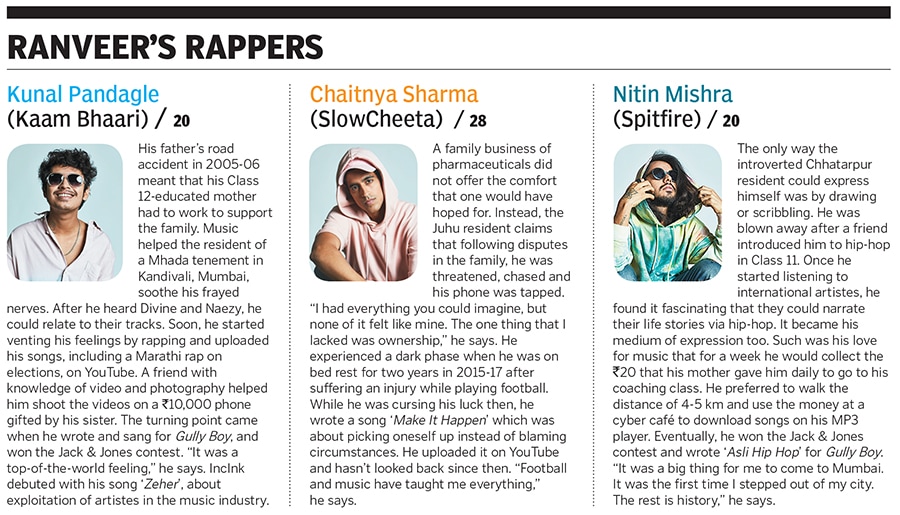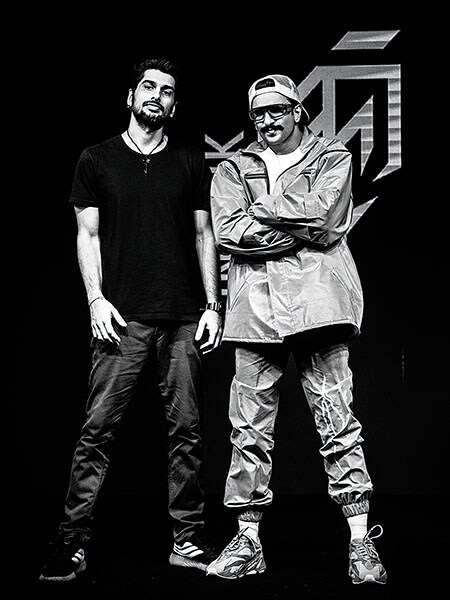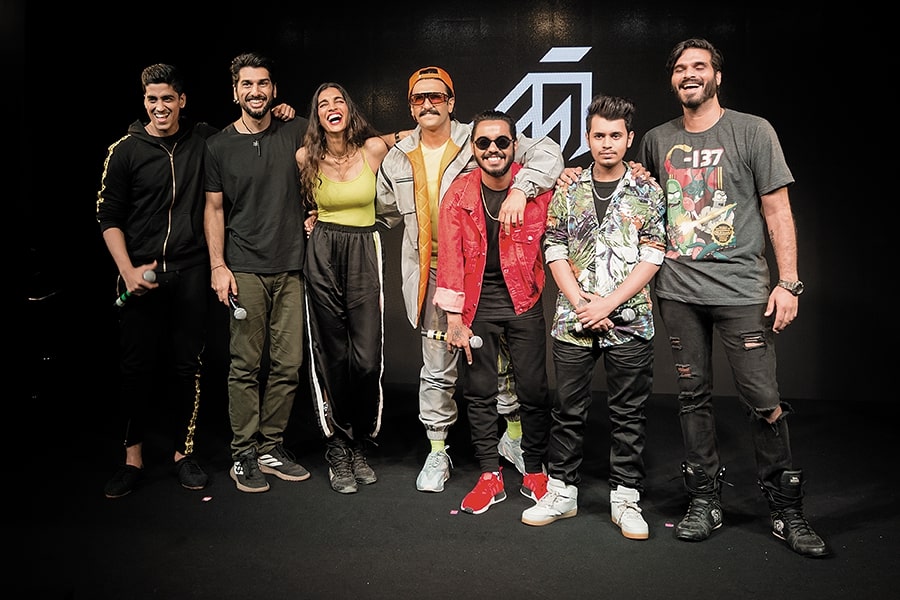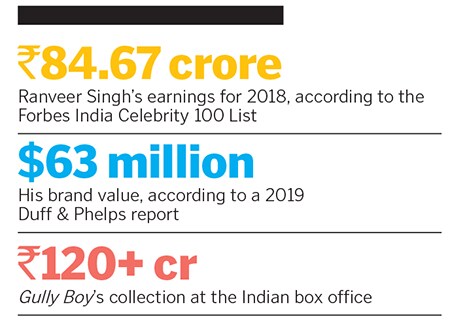Ranveer Inc(Ink): Can Gully Boy triumph in the music business?
The actor has launched an independent music label to promote raw hip-hop artistes in the country. Ranveer Singh's entrepreneurial tryst—much like the star himself—is quite unusual
0405_s.jpg?im=Resize,width=600,aspect=fit,type=normal)
0405_s.jpg?im=Resize,width=600,aspect=fit,type=normal)
0405.jpg)
Image: Rohan Shrestha Styling: Nitasha Gaurav
“Bright pink… I like it,” gushes Ranveer Singh as he walks into a sunlit room at his Khar apartment in Mumbai and sees the colour of my T-shirt. In contrast, the 34-year-old actor is wearing a white T-shirt with the word ‘Baby’ printed on it, his colourful beach shorts the only indication of his flamboyant and quirky sartorial tastes.
The energy that is synonymous with his personality, though, is immediately on display as he settles on the couch, cross-legged, and calls for his iPad. “Lucky you… you get to eat this. I can’t, I’m on a diet,” says Singh, 34, pointing to the sandwiches and cookies kept on the centre table, while he waits for his gadget. Once in his hand, there’s a twinkle in his eye. He swipes left and right, and shows photos and videos of him imitating Kapil Dev’s bowling action. “I’m almost there,” says Singh of his action and jump, prior to leaving for a shooting schedule in London in May. The actor essays the role of the former India captain in 83, a film based on India’s maiden cricket World Cup win that is scheduled for an April 2020 release.
Like the protagonist of the movie, Singh, too, is aiming to be an all-rounder, a multi-hyphenate in the film industry. While as an actor he has already earned his spurs with an enviable run at the box office in the recent past—his last release, Gully Boy (2019), apart from being a commercial hit is India’s official entry to the Oscars—he’s now using his success and stardom to venture into something else close to his heart: Music.
Earlier this year, Singh, who will complete a decade in the industry next year, and his best friend, Navzar Eranee, 34, launched IncInk, an independent music label that aims to promote raw hip-hop and rap artistes in the country. It has initially taken three youngsters under its wing: Kunal Pandagle (Kaam Bhaari) from Kandivali, Mumbai, Chaitnya Sharma (SlowCheeta), a resident of Juhu in Mumbai, and Nitin Mishra (Spitfire), who hails from Chhatarpur, a small city in Madhya Pradesh.
It is an unusual entrepreneurial foray for someone from the film fraternity. So far, actors have invested their monies in ventures that range from fitness and production to owning sports franchises. If Hrithik Roshan has started HRX, a homegrown fitness brand that sells apparel, shoes and accessories, Ranbir Kapoor is the co-owner of Mumbai City FC, a football team in the Indian Super League (ISL). Abhishek Bachchan owns the Jaipur Pink Panthers, a Pro Kabaddi League team, and co-owns Chennaiyin FC that won the ISL in 2015 and 2017-18. Shah Rukh Khan runs a production house, Red Chillies, which produces and distributes movies as well as has a VFX division. The superstar also co-owns the Kolkata Knight Riders, one of the richest cricket teams in the Indian Premier League that has won the T20 tournament twice. Anushka Sharma has launched her clothing line, NUSH. And Preity Zinta is the co-owner of IPL team Kings XI Punjab.
For Singh though, IncInk is more than a business. “My primary art is acting. For me, this is a pure passion project. It’s about giving back. If I see talented people making good art, I want to do my bit to get their voices heard. It’s a label that focuses on free creative expression. This music is important. We want music that’s potent, that the youth can connect with,” says Singh, who would enjoy listening to tapes of rap and hip-hop singers that his cousin brought from America since he was in Class 3. Images: Sheldon Santos[br]IncInk—where Inc stands for inclusive and Ink for Inkalab (revolution)—began as an idea around 2015-16 when Eranee, who’s also an ad filmmaker, and Singh collaborated for an advertisement for apparel brand Jack & Jones. It involved hip-hop and the resultant success prompted the brand to invite entries for its next commercial. As the duo whittled down thousands of videos sent from across India to 15 and eventually four, including the trio launched by IncInk, their eyes opened up to the popularity of the genre and enormity of hip-hop talent in India. “Once we realised the value of their work, we decided we wanted to do something with them… we didn’t know what. The idea of calling it IncInk and making it a record label was just an extension of the experience that we had with the boys. It was completely organic,” says Eranee, who is the co-founder and chief creative officer of IncInk.
Images: Sheldon Santos[br]IncInk—where Inc stands for inclusive and Ink for Inkalab (revolution)—began as an idea around 2015-16 when Eranee, who’s also an ad filmmaker, and Singh collaborated for an advertisement for apparel brand Jack & Jones. It involved hip-hop and the resultant success prompted the brand to invite entries for its next commercial. As the duo whittled down thousands of videos sent from across India to 15 and eventually four, including the trio launched by IncInk, their eyes opened up to the popularity of the genre and enormity of hip-hop talent in India. “Once we realised the value of their work, we decided we wanted to do something with them… we didn’t know what. The idea of calling it IncInk and making it a record label was just an extension of the experience that we had with the boys. It was completely organic,” says Eranee, who is the co-founder and chief creative officer of IncInk.
It was also the time when Singh was shooting for Befikre (2016) in Paris and had just signed Gully Boy—based on the real-life stories of Indian rappers Divine (Vivian Fernandes) and Naezy (Naved Shaikh)—that brought the underground hip-hop and rap world alive on celluloid. The actor had no inkling that the genre would become so popular. The realisation dawned closer to the release of the film when they were also putting the final structures of IncInk in place. “Hip-hop is bigger than what I thought. It is a current phenomenon and growing exponentially,” explains Singh, IncInk’s co-founder.
Gully Boy went on to collect over ₹120 crore at the Indian box office, but what it did culturally was more significant. Among other things, it spoke about understanding one’s worth and having the fire in the belly to chase dreams by overcoming obstacles like a dysfunctional family and/or poverty. Its chartbuster ‘Apna Time Aayega’ has almost become an anthem, clocking more than 185 million views on YouTube as of October.
Singh concedes that it was important for Gully Boy to release to give IncInk a boost. But Eranee—who the actor says studied the business of music in India and across the world for a year before launching the label—was confident of its viability and popularity. “I think hip-hop’s nature is traditionally Indian. The language of delivery and packaging are Western. There is value in it, financially as well,” says Eranee. His friendship with Singh goes back to the days when he would board a train from Andheri every day and Singh the same local from Bandra when they studied at HR College in South Mumbai. “I started dating the girl who had dumped him for me. So we became friends,” says Singh with a wry smile. They even worked together as assistant directors in the past.  Navzar Eranee (left) and Ranveer Singh have been friends since their student days
Navzar Eranee (left) and Ranveer Singh have been friends since their student days
Image: Tanya Agarwal[br]IncInk provided an opportunity for the duo to leverage each other’s strengths. “He did all the study for the label. He is the man behind it all. He makes things happen. I am connected and involved, but hands off. Navzar’s process is one that requires a bouncing board and I fill those shoes,” says the actor. Eranee says the partnership was obvious given their love for music. “He’s an avid hip-hop listener. He’s more educated than most people about rap and hip-hop. He’s connected to the language and the music. It was a no-brainer,” he says. Once certain of the plan, they roped in Anushka Manchanda (NUKA) and Shikhar Manchanda (RÄ€KHIS) as head of music.
As a medium for voicing problems in society through powerful lyrics, IncInk debuted with Kaam Bhaari’s ‘Zeher’ that makes a comment on the flawed system in the music industry where artistes are often exploited. Kaam Bhaari lives in a 300 sq ft tenement in Kandivali with five family members. His father’s road accident in 2005-06 resulted in his mother having to do odd jobs to keep the house running. The trying conditions apart, he had temper issues during his growing up years. Music helped him deal with those. He’s now happy with the exposure and opportunity that IncInk have provided. “It inspires me to do even better, and try my best to not let the team down,” says Kaam Bhaari, who has even acted in and sung for Gully Boy.
Similarly, SlowCheeta, who says the one thing that he lacked was belonging, admits that his association with IncInk means the world to him. “Music was my hobby, my passion, but it wasn’t a job. The label made it a legit, bankable job for me. But more than that, the team is like family. Even my family did not repose so much trust in me,” he says. SlowCheeta’s first track ‘Bada Ghar, Chhota Ladka’ is an introduction to him, the perception that people have about his life as opposed to what it actually is.
Music was an escape for Spitfire too. After a friend introduced him to hip-hop, he was fascinated that people could narrate their ordeals through words that touched the right chord. It became an outlet for the introvert to express himself. He stepped out of Chhatarpur and came to Mumbai for the first time after winning the Jack & Jones contest. Life took a different turn once IncInk became a reality and his song ‘Paathshala’ was released on the platform. “Ranveer gave us recognition. He held our hand and put us in the limelight. I feel blessed that I got this,” says Spitfire, who also wrote songs for Singh’s character Murad in Gully Boy.The music label, acknowledges Singh, is pro-artiste, but there is a strict criterion before the team agrees to launch a song. Besides what the rappers are seeing and writing, there is an analysis of the social commentary they are making. It’s about voicing the ills of issues like fascism, communalism, female infanticide, dowry, corruption, oppressive practices and discrimination in a colloquial language, but vicious tone. “They are spiritually connected, gifted kids… they have a worldview beyond their years,” says Singh of IncInk’s first three choices. “These boys have seen a lot in life and to put their experiences down in an artistic way is special. It’s special because it’s authentic. There is a lot of truth in what they are saying. And that’s why this music is powerful.”
The actor, who ranks No 8 on the 2018 Forbes India Celebrity 100 List with earnings of ₹84.67 crore, does not reveal the investment that has gone into IncInk apart from saying they have put in a lot of money in the business. He knows that the returns will come over time and hopes that the label does well financially in the long run. “It’s not a not-for-profit. We would like our artistes to make money. We’re hoping that the label makes profit it should be a profitable business that pays for itself. Honestly, whatever I make out of this, I’ll probably put it back. It’s a fraction of what I am making from films and endorsements,” says Singh, whose musical choices vary from Nusrat Fateh Ali Khan to Pink Floyd and Eminem to Bappi Lahiri.
Eranee and Singh are understandably bullish about the genre that has started to resonate with the youth. But it’s still early days for hip-hop in India, according to experts. Unlike the US, where it originated as an underground movement and a means of protest in Bronx, New York, in the 1970s, this form of music is still playing catch-up here. While the West has icons like Nas, Jay Z, Lil’ Wayne, Dr Dre, 50 Cent, Kanye West and Snoop Dogg among others, India does not really have any hip-hop artistes who have created an impact.
“Hip-hop is native to the US and has grown to other parts of the world. It’s too early [in India] for it to be anywhere as close to being powerful as it’s in the West. It is still at a nascent stage,” says Uday Benegal, founding member of Indus Creed, a rock group based in Mumbai.
Krishna Jhaveri, bass guitarist with Gully Gang, a Mumbai-based hip-hop crew, concurs. “The birth of hip-hop happened in the US. It has had the time to go from underground to mainstream. It permeates every level. India did not have access to it earlier, but now, thanks to the internet and cheap streaming, it does. And that’s why we are seeing a hip-hop boom in India,” he says.
The success of Gully Boy—one of the first Indian films related to hip-hop—certainly points to that. If hip-hop emerged from the streets and ghettos of America, here it is slowly becoming the voice of people inhabiting in slums and chawls, or the oppressed and marginalised. “The movie played a part in letting people, who did not know already, know about the music. The scene always existed, but people suddenly became aware of it,” says Jhaveri.
Benegal hopes that Singh is not latching on to a trend or spinning off a movie he starred in. He wants the actor to stick to his promise of providing a platform to those who want to express themselves through intricate word play. The relevance of record labels, he adds, is narrowly defined today unlike, in the past, when they controlled everything except song writing. “You sign with a label because it is going to provide you with the marketing support and give you the noticeability that you require in a crowded place. If a record company cannot provide that, then it’s of no value at all,” says Benegal.
It’s a tad early to predict IncInk’s future, but Jhaveri is glad that the actor has launched a unique label. “It’s a good move to pump money in that direction. It will help artistes kick off,” he says.
Singh, who has 30 endorsements in his kitty and a brand value of $63 million, according to a 2019 Duff & Phelps report, is aware of the responsibilities that come along with the task he has undertaken. Like some of his peers, he, too, is inundated with offers to start a clothing line and become a brand ambassador of a sporting league or team. The actor says he is not averse to such ventures. “Those things are always in the offing, but I am not in a rush. I am eventually going to extend myself into all these things… I am open to it all,” he admits.
For now, outside acting, IncInk remains Singh’s focus. Once the teething issues are resolved, the label intends to come out with videos every two weeks. And it plans to monetise its art work through merchandise. “Our immediate priority is to serve the artistes well, put their music out and make them visible. We are also looking at launching new rappers,” says Eranee.
Music experts believe that the actor seems to have got the pulse of a nation with a sizeable population of youngsters. Hip-hop’s time has come, they feel, and it’s a form of expression that will only grow stronger with time. “It’s like a new instrument because the spoken word becomes an instrument in itself. I would be surprised if it died out anytime soon. It has the power to grow tremendously,” says Benegal. Adds Jhaveri: “It will either go through a slump or hit a peak, but it won’t be static for sure. Like everything else, it is unpredictable. But it looks promising.” Team IncInk with the rappers whose songs they have launched: (from left) SlowCheeta, Navzar Eranee, Anushka Manchanda, Ranveer Singh, Spitfire, Kaam Bhaari and Shikhar Manchanda
Team IncInk with the rappers whose songs they have launched: (from left) SlowCheeta, Navzar Eranee, Anushka Manchanda, Ranveer Singh, Spitfire, Kaam Bhaari and Shikhar Manchanda
Image: Focusmonk[br]The unprecedented run that Singh has had at the box office of late only augurs well for IncInk.
While his new venture has him as excited as stepping into Kapil Dev’s shoes, he admits that he gets tremendous joy and fulfilment from acting. Eranee concedes that it is important for Singh to do well in his primary role for the label to benefit. He says sometimes he has to call Singh thrice a day just to make sure he can talk to him over the phone once. “Not because he is not making himself available, but because he is busy with other things. It is only logical that he serves his own interests as an artiste first. We need him to be working, to be popular, to be promoting IncInk… it goes hand-in-hand,” says Eranee.
Singh isn’t complaining about the workload. “I don’t know how to show my gratitude for everything that I have received from the universe but by giving it back,” he says.
First Published: Nov 11, 2019, 10:31
Subscribe Now